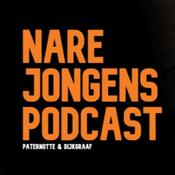738 afleveringen

It’s okay to not be okay
22-12-2025 | 58 Min.
It’s not always the most wonderful time of the year. Every December, we’re told to be merry and stay positive. But a lot of us don’t feel that way. And when we don’t, the pressure to be happy makes everything worse. Sadness feels like failure. Grief feels like a personal mistake. Depression becomes something to hide. But what if dark moods aren’t problems to fix? What if they’re part of being human? Today’s guest is philosopher Mariana Alessandri, author of Night Vision, a book about how to honor the emotions we usually try to outrun. It’s not a celebration of sadness, but Alessandri calls bullshit on the culture of toxic positivity and the idea that happiness is something we’re supposed to choose on command. Sean and Mariana talk about why Americans are addicted to the light, why “cheering people up” often backfires, how Stoicism shaped our emotional habits, and what it looks like to sit with grief instead of shaming ourselves for feeling it. Host: Sean Illing (@SeanIlling) Guest: Mariana Alessandri (@mariana.alessandri), associate professor of philosophy at the University of Texas-Rio Grande Valley and author of Night Vision: Seeing Ourselves Through Dark Moods. We would love to hear from you. To tell us what you thought of this episode, email us at [email protected] or leave us a voicemail at 1-800-214-5749. Your comments and questions help us make a better show. And you can watch new episodes of The Gray Area on YouTube. Listen to The Gray Area ad-free by becoming a Vox Member: vox.com/members. This holiday season, your membership goes further: when you join Vox as an annual Member, we’ll gift a free membership to a reader who can’t afford it. By joining today, you’ll get 30% off for an annual membership, and we’ll match your membership. And if you can’t afford it, visit that same link to apply for a free membership through our gift program. Learn more about your ad choices. Visit podcastchoices.com/adchoices

Forgiveness is optional
15-12-2025 | 1 u. 4 Min.
You have to forgive people who wrong you…right? The world is filled with injustice and wrongdoing, and to live in the world — to not be consumed by anger — forgiveness is necessary. At least that’s what we’re told over and over again: By forgiving, we can set ourselves free.But is there a cost to forgiveness? Are we forgiving too quickly and too often? Today’s guest is philosopher Myisha Cherry, whose book Failures of Forgiveness critiques our cultural obsession with forgiving those who have done us wrong. She’s not against forgiveness — that would be weird — but she says we ought to be more intentional about why we do it, more aware that the expectation to practice forgiveness often lands on the most vulnerable people, and more concerned about what gets lost when we treat forgiveness as the only path to healing. Sean and Myisha discuss the 2015 Charleston church shooting, the legacy of slavery, and the real difference between accountability, reconciliation, and simply moving on. Host: Sean Illing (@SeanIlling) Guest: Myisha Cherry (@myishacherry), associate professor of philosophy at the University of California Riverside, and author of Failures of Forgiveness: What We Get Wrong and How to Do Better. This episode was made in partnership with Vox's Future Perfect team. Vox had full discretion over the content of this reporting. We would love to hear from you. To tell us what you thought of this episode, email us at [email protected] or leave us a voicemail at 1-800-214-5749. Your comments and questions help us make a better show. And you can watch new episodes of The Gray Area on YouTube.Listen to The Gray Area ad-free by becoming a Vox Member: vox.com/members. This holiday season, your membership goes further: when you join Vox as an annual Member, we’ll gift a free membership to a reader who can’t afford it. By joining today, you’ll get 30% off for an annual membership, and we’ll match your membership. And if you can’t afford it, visit that same link to apply for a free membership through our gift program. Learn more about your ad choices. Visit podcastchoices.com/adchoices

The pornification of everything
08-12-2025 | 56 Min.
Sean’s guest today is Daniel Kolitz, author of a remarkable Harper’s story on “gooning.” They talk about this emerging subculture and how it reflects back on the larger world, from the economics of attention to the rise of short-form everything. Kolitz explains why the Gooniverse isn’t just about porn, how hyperkinetic media rewires our sense of pleasure and patience, and why this is really a story about how society is changing in ways we might not like. Host: Sean Illing (@SeanIlling) Guest: Daniel Kolitz, author of The Goon Squad We would love to hear from you. To tell us what you thought of this episode, email [email protected] or leave us a voicemail at 1-800-214-5749. Your comments and questions help us make a better show. And you can watch new episodes of The Gray Area on YouTube.. Listen to The Gray Area ad-free by becoming a Vox Member: vox.com/members. This holiday season, your membership goes further: when you join Vox as an annual Member, we’ll gift a free membership to a reader who can’t afford it. By joining today, you’ll get 30% off for an annual membership, and we’ll match your membership. And if you can’t afford it, visit that same link to apply for a free membership through our gift program. Learn more about your ad choices. Visit podcastchoices.com/adchoices

What counts as progress?
01-12-2025 | 41 Min.
We’ve never had more wealth, more data, or more ways to be entertained. So why doesn’t it feel like progress? Sean’s guest today is Brad DeLong, an economic historian at UC Berkeley and author of Slouching Towards Utopia. They talk about the difference between getting richer and living well, and why the real hinge of the 21st century might be attention rather than growth. DeLong explains how AI could make life easier or simply make us more distracted, why the world’s progress continues even as American politics falters, and what smart policy could do for the people left behind by technological change. Host: Sean Illing (@SeanIlling) Guest: J. Bradford DeLong, economic historian and author of Slouching Towards Utopia We would love to hear from you. To tell us what we thought of this episode, email us at [email protected] or leave us a voicemail at 1-800-214-5749. Your comments and questions help us make a better show. And you can watch new episodes of The Gray Area on YouTube. Listen to The Gray Area ad-free by becoming a Vox Member: vox.com/members This episode was supported by a grant from Arnold Ventures. Vox had full discretion over the content of this reporting. Learn more about your ad choices. Visit podcastchoices.com/adchoices

How to survive awkward encounters
17-11-2025 | 56 Min.
We all know what awkwardness feels like. It's that jolt of discomfort when the social script breaks down, and no one knows what to do next. But what if awkwardness isn’t a flaw to fix but a window into how we live together? Sean’s guest today is Alexandra Plakias, associate professor of philosophy at Hamilton College and author of Awkwardness: A Theory. They talk about why awkwardness isn’t a personal problem but a social one, how power and privilege shape who gets to be awkward, and why our fear of discomfort often keeps us from saying what really matters. This episode originally aired in November of 2024. Host: Sean Illing (@SeanIlling) Guest: Alexandra Plakias, associate professor of philosophy and author of Awkwardness: A Theory We would love to hear from you. To tell us what you thought of this episode, email us at [email protected] or leave us a voicemail at 1-800-214-5749. Your comments and questions help us make a better show.And you can watch new episodes of The Gray Area on YouTube. Listen to The Gray Area ad-free by becoming a Vox Member: vox.com/members Learn more about your ad choices. Visit podcastchoices.com/adchoices
Meer Nieuws podcasts
Trending Nieuws -podcasts
Over The Gray Area with Sean Illing
Luister naar The Gray Area with Sean Illing, De Dag en vele andere podcasts van over de hele wereld met de radio.net-app

Ontvang de gratis radio.net app
- Zenders en podcasts om te bookmarken
- Streamen via Wi-Fi of Bluetooth
- Ondersteunt Carplay & Android Auto
- Veel andere app-functies
Ontvang de gratis radio.net app
- Zenders en podcasts om te bookmarken
- Streamen via Wi-Fi of Bluetooth
- Ondersteunt Carplay & Android Auto
- Veel andere app-functies


The Gray Area with Sean Illing
download de app,
luisteren.






































